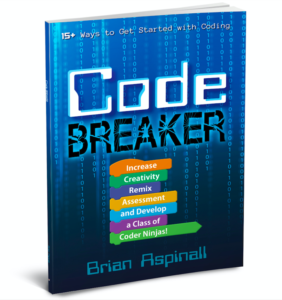Berry, M. (2013). Computing in the National Curriculum. A Guide for Primary Teachers. Bedford, UK: Computing at School.
Bers, M. U., Flannery, L., Kazakoff, E. R., & Sullivan, A. (2014). Computational thinking and tinkering: Exploration of an early childhood robotics curriculum. Computers & Education, (72)145-157. doi:10.1016/j.compedu.2013.10.020
Drake, S.M. (2014). Designing across the curriculum for “sustainable well-being”: A 21st century approach. In F. Deer, T. Falkenberg, B. McMillan, & L. Sims (Eds.), Sustainable well-being: Concepts, issues, and educational practice (pp. 57–76). Winnipeg, MB: Education for Sustainable Well-Being (ESWB) Press. Retrieved from: www.eswbpress.org/uploads/1/2/8/9/12899389/sustainable_well-being_2014.pdf#page=65
Fullan, M. (2013). Great to excellent: Launching the next stage of Ontario’s education agenda. Toronto: Ontario Ministry of Education. Retrieved from: www.edu.gov.on.ca/eng/document/reports/FullanReport_EN_07.pdf
Gadanidis, G. (2012). Why can’t I be a mathematician? For the Learning of Mathematics, 32(2), 20-26. Available at http://researchideas.ca/documents/05-Gadanidis.pdf
Gadanidis, G. (2015a). Coding as a Trojan Horse for Mathematics Education Reform. Journal of Computers in Mathematics and Science Teaching, 34(2), 155-173
Gadanidis, G. (2015b). Coding for Young Mathematicians. Western University.
Gao, X., & Grisham-Brown, J. (2011). The use of authentic assessment to report accountability data on young children’s language, literacy and pre-math competency. International Education Studies, 4(2), 41-53. Retrieved from http://search.proquest.com/docview/869134928?accountid=15115
Graf, E. A., & Arieli-Attali, M. (2015). Designing and developing assessments of complex thinking in mathematics for the middle grades. Theory into Practice, 54(3), 195. Retrieved from http://search.proquest.com/docview/1696709041?accountid=15115
Hargreaves, E. (1997). Mathematics assessment for children with english as an additional language. Assessment in Education, 4(3), 401-411. Retrieved from http://search.proquest.com/docview/204050692?accountid=15115
Harlen, W., & Winter, J. (2004). The development of assessment for learning: Learning from the case of science and mathematics. Language Testing, 21(3), 390-408. doi:http://dx.doi.org/10.1191/0265532204lt289oa
Jeltova, I., Birney, D., Fredine, N., Jarvin, L., Sternberg, R. J., & Grigorenko, E. L. (2011). Making instruction and assessment responsive to diverse students’ progress: Group-administered dynamic assessment in teaching mathematics. Journal of Learning Disabilities, 44(4), 381-95. Retrieved from http://search.proquest.com/docview/896536585?accountid=15115
Kafai, Y.B., & Burke, Q. (2013). Computer Programming Goes Back to School. Phi Delta Kappan, 95(1), 63-65, 2013
Kazakoff, E. R., & Bers, M. U. (2014). Put Your Robot In, Put Your Robot Out: Sequencing Through Programming Robots In Early Childhood. Journal Of Educational Computing Research, 50(4), 553-573. doi:10.2190/EC.50.4.f
Kazakoff, E., Sullivan, A., & Bers, M. (2013). The Effect of a Classroom-Based Intensive Robotics and Programming Workshop on Sequencing Ability in Early Childhood. Early Childhood Education Journal, 41(4), 245-255. doi:10.1007/s10643-012-0554-5
Levine, R. (2009). Curriculum-based dynamic assessment emphasizing a triarchic model and language abilities: Examining the utility of this testing method in elementary school mathematics classrooms (Order No. 3349141). Available from ProQuest Education Journals. (305047877). Retrieved from http://search.proquest.com/docview/305047877?accountid=15115
Liang, X. (2010). Assessment use, self-efficacy and mathematics achievement: Comparative analysis of PISA 2003 data of finland, canada and the USA. Evaluation & Research in Education, 23(3), 213. Retrieved from http://search.proquest.com/docview/868061586?accountid=15115
Misfeldt, M., & Ejsing-Duun, S. (2015). Learning Mathematics Through Programming: An Instrumental Approach to Potentials and Pitfalls. In Proceedings of the 9th Congress of European Research
Morgan, C., Tsatsaroni, A., & Lerman, S. (2002). Mathematics teachers’ positions and practices in discourses of assessment. British Journal of Sociology of Education, 23(3), 445-461. Retrieved from http://search.proquest.com/docview/206172116?accountid=15115
Nguyen, D. M., Hsieh, Y. J., & Allen, G. D. (2006). The impact of web-based assessment and practice on students’ mathematics learning attitudes. The Journal of Computers in Mathematics and Science Teaching, 25(3), 251-279. Retrieved from http://search.proquest.com/docview/220630959?accountid=15115
Ontario Ministry of Education. (2016). 21st Century Competencies: Foundation Document for Discussion Retrieved from: http://www.edugains.ca/resources21CL/About21stCentury/21CL_21stCenturyCompetencies.pdf
Ontario Ministry of Education. (2005). The Ontario curriculum grades 1‐8: Mathematics. Retrieved from http://www.edu.gov.on.ca/eng/curriculum/elementary/math18curr.pdf
Papert, S. (1993) Turtle geometry: A mathematics made for learning. Chapter 3 in Mindstorms: Children, Computers, And Powerful Ideas.
Resnick, M., Maloney, J., Monroy-Hernandez, A., Rusk, N., Eastmond, E., Brenna, K., Millner, A., Rosenbaum, E., Silver, J., Silvername, B., Kafair, Y. (2009). “Digital Fluency” Should mean designing, creating, and remixing, not just browsing, chatting, and interacting. Communications of the ACM, 52(11), 60-67.
Sammon, K. B., Kobett, B., & al, e. (1992). Linking instruction and assessment in the mathematics classroom. The Arithmetic Teacher, 39(6), 11. Retrieved from http://search.proquest.com/docview/208771651?accountid=15115
Smith, C. P., & Neumann, M. D. (2014). Scratch it out! Enhancing Geometrical Understanding. Teaching Children Mathematics, 21(3), 185-188.
Sneider, C., Stephenson, C., Schafer, B., & Flick, L. (2014). Exploring the science Framework and NGSS: Computational thinking in the science classroom. Science Scope, 38(3), 10-15.
Suurtamm, C., & Koch, M. J. (2014). Navigating dilemmas in transforming assessment practices: Experiences of mathematics teachers in ontario, canada. Educational Assessment, Evaluation and Accountability, 26(3), 263-287. doi:http://dx.doi.org/10.1007/s11092-014-9195-0
Suurtamm, C., Koch, M., & Arden, A. (2010). Teachers’ assessment practices in mathematics: Classrooms in the context of reform. Assessment in Education, 17(4), 399. Retrieved from http://search.proquest.com/docview/821956768?accountid=15115
Thomas, C. N., Van Garderen, D., Scheuermann, A., & Lee, E. J. (2015). Applying a universal design for learning framework to mediate the language demands of mathematics. Reading & Writing Quarterly, 31(3), 207. Retrieved from http://search.proquest.com/docview/1683616180?accountid=15115
Wallace, M. (2011). Developing assessment practices: A study of the experiences of preservice mathematics teachers as learners and the evolution of their assessment practices as educators(Order No. 3499583). Available from ProQuest Education Journals. (944324214). Retrieved from http://search.proquest.com/docview/944324214?accountid=15115
Watson, A. (2006). Some difficulties in informal assessment in mathematics. Assessment in Education, 13(3), 289-303. Retrieved from http://search.proquest.com/docview/204048130?accountid=15115
Wing, J. M. (2006). Computational thinking. Communications of the ACM, 49(3), 33-35 http://www.cs.cmu.edu/afs/cs/usr/wing/www/publications/Wing06.pdf
Yin, Y., Olson, J., Olson, M., Solvin, H., & Brandon, P. R. (2015). Comparing two versions of professional development for teachers using formative assessment in networked mathematics classrooms. Journal of Research on Technology in Education, 47(1), 41-70. Retrieved from http://search.proquest.com/docview/1646385125?accountid=15115
